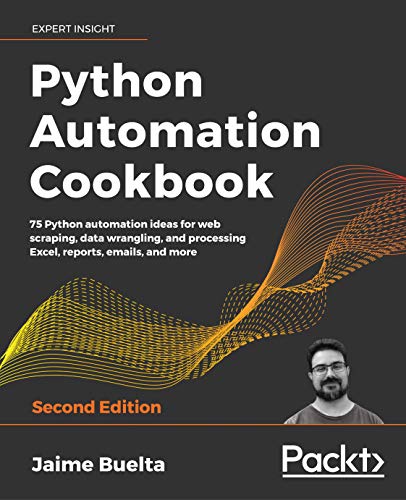Python Automation Cookbook: 75 Python automation ideas for web scraping, data wrangling, and processing Excel, reports, emails, and more, 2nd Edition Link to heading
Summary Link to heading
“Python Automation Cookbook, 2nd Edition” by Jaime Buelta is a practical guide focused on automating a variety of tasks using Python. The book covers a wide range of use cases such as web scraping, data wrangling, and the manipulation of data in formats like Excel, handling of emails, and report automation. It is designed for readers who wish to gain hands-on experience with Python scripting to streamline routine tasks efficiently. Each chapter is structured to introduce a particular automation problem followed by detailed solutions leveraging Python’s capabilities.
Review Link to heading
The book has been well-received for its clear and concise approach to presenting Python automation techniques. One of its significant strengths is the real-world relevance of the tasks it addresses, making it a practical resource for both novices and experts. Readers appreciate the inclusion of ready-to-use scripts that demonstrate how Python can be used effectively to save time and minimize manual labor. However, some critiques mention that the book might require readers to have a basic understanding of Python, as it jumps quickly into action without a detailed introduction to Python fundamentals.
Key Takeaways Link to heading
- Web Scraping: Techniques using libraries like Beautiful Soup and requests to automate the retrieval of web data.
- Data Wrangling: Efficient handling of large datasets and transforming data structures using pandas and other libraries.
- Excel Automation: Automating tasks involving Excel spreadsheets through libraries like openpyxl and pandas.
- Email Handling: Automating email processes including sending and parsing email contents using smtplib and imaplib.
- Task Scheduling: Using Python scripts in combination with schedulers like cron for routine task automation.
Recommendation Link to heading
This book is highly recommended for developers, data analysts, and IT professionals who have a basic understanding of Python and are looking to enhance their productivity through automation. The practical examples provided make it a valuable resource for anyone keen on implementing Python-driven workflow efficiencies in their daily tasks. Whether you’re looking to speed up data processing, automate repetitive tasks, or transition to a more code-intensive environment, this cookbook provides the necessary tools and knowledge.
